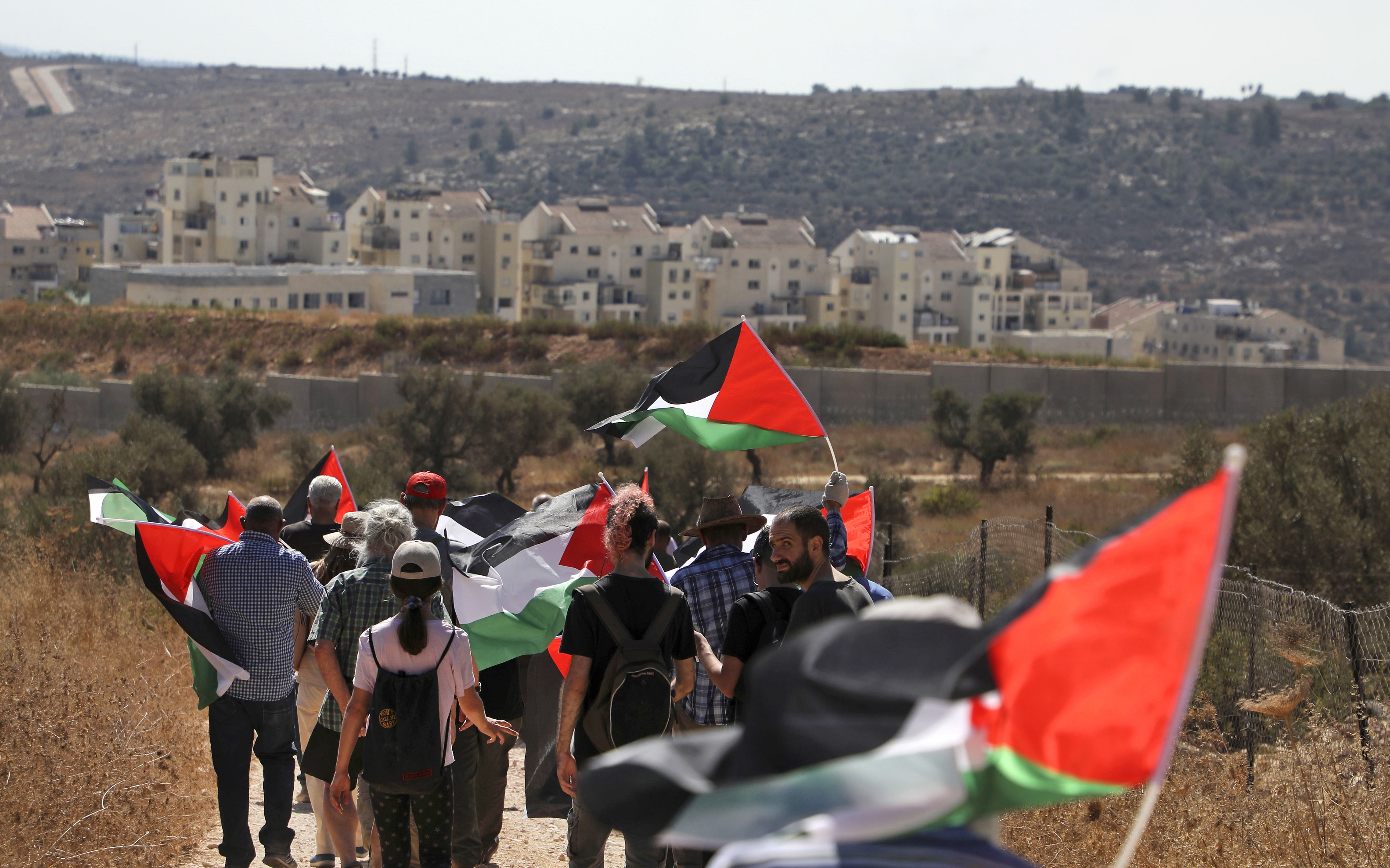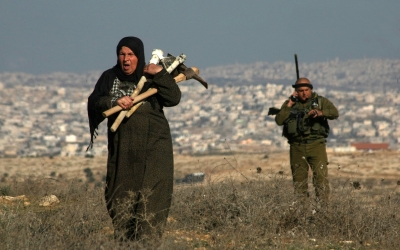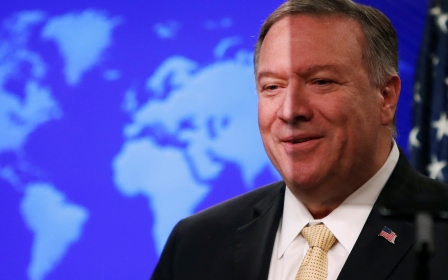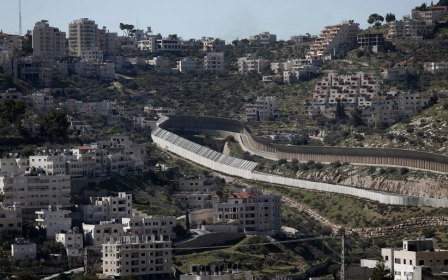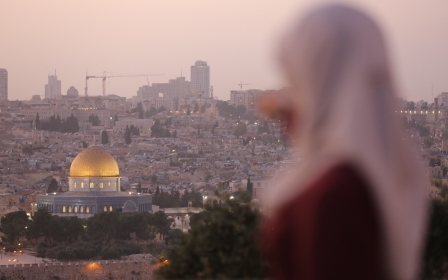'A green light' for annexation: Palestinians fear fallout of US backing Israeli settlements
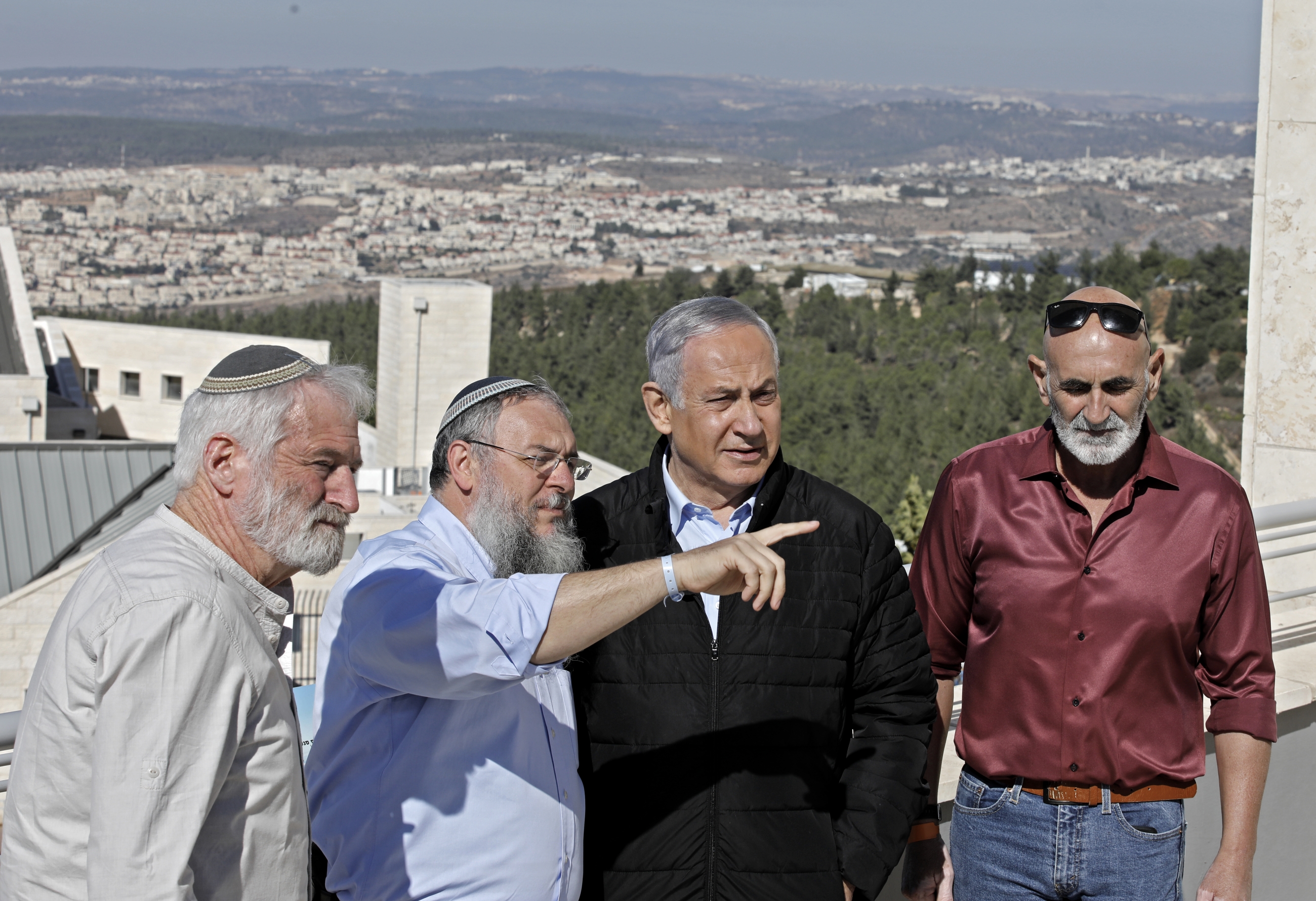
For two months, Jalal Khalil has lived in a state of anxiety, expecting his family home to be demolished on any given day.
Now, following the US government's announcement that it no longer deems Israeli settlements in violation of international law, Khalil and many others fear not only their homes, but their lands and the future state of Palestine are also at risk.
An Israeli court on Wednesday is due to decide the fate of Khalil’s home and the houses of five other Palestinian families from the same village of Kobar, northwest of Ramallah in the central occupied West Bank.
“Yesterday’s US statement has multiplied our fears and we are now almost certain that the court will not rule in our favour,” Khalil said in reference to US Secretary of State Mike Pompeo’s announcement that Israel's settlements in the occupied West Bank are not "inconsistent with international law".
The Israeli court claimed in September that the West Bank structures were built in violation of a construction ban and must be demolished, a practice that has seen 155 housing units destroyed in East Jerusalem alone this year, according to Israeli human rights group B'Tselem, leaving 269 families without a home.
Trump's gifts to Israel
+ Show - HideThe Trump administration's bombshell announcement that it no longer considers Israeli settlements in the occupied West Bank illegal under international law has sent shockwaves through the region.
But it's only the latest in a long line of unilateral gifts offered by Donald Trump to Israel since the president took up residence in the White House in January 2017.
Middle East Eye takes a look at how Trump has promoted Israeli interests at the expense of the Palestinians:
Pro-Israel aides: Friedman, Kushner and Greenblatt
From the first moment Trump stepped in the Oval Office he appointed a raft of aides with close ties to Israel and the settlement movement.
Two of the first, and most prominent, tasked with dealing with the Israel-Palestine conflict were Jared Kushner, his son-in-law, and Jason Greenblatt, his personal lawyer.
Kushner and Greenblatt have been heavily involved in the so-called "deal of the century" peace plan, however their loyalties are heavily weighed in Israel's favour.
Kushner's family are close friends of Israeli Prime Minister Benjamin Netanyahu, and donated money to settlement organisations.
As Middle East envoy, Greenblatt, meanwhile, has consistently defended Israeli actions against Palestinians.
David Friedman, US ambassador to Israel, has been the Israelis' chief cheerleader since taking office in May 2017, telling the New York Times that “under certain circumstances, I think Israel has the right to retain some, but unlikely all, of the West Bank".
In July, Friedman and Greenblatt opened a highly controversial tunnel under the Palestinian neighbourhood of Silwan in occupied East Jerusalem.
The US ambassador was seen taking a hammer to a wall in the ancient archaeological site with particular zeal, in an event organised by settler group ELAD.
Recognising Jerusalem as Israel's capital
In a clear sign that Washington was prepared to upend years of convention and consensus in Israel's favour, Trump announced in December 2018 that the United States recognised Jerusalem as the Israeli capital.
East Jerusalem has been occupied since the 1967 Middle East war, and the Palestinians seek it as their capital of any future state.
The international community has maintained that Jerusalem's status must be agreed upon in a settlement between the Israelis and Palestinians, and in response to Trump's move 128 states condemned the decision in a UN General Assembly vote.
On 14 May 2018 - the 70th anniversary of Israel's founding - the US officially moved its embassy from Tel Aviv to Jerusalem.
Demonstrations erupted in the Gaza Strip and the West Bank, with Israeli forces killing at least 57 Palestinians as Kushner and his wife Ivanka Trump grinned at the embassy's opening.
Cutting funds for UNRWA
In early 2019, the US cut all funding to the UN agency that supports Palestinian refugees, UNRWA, saying its business model and fiscal practices were of an "irredeemably flawed operation".
UNRWA provides services to about five million Palestinian refugees, with the US a significant donor since the agency's founding following the 1948 creation of Israel.
In 2018, Washington gave UNRWA $125m in aid, and the agency has scrambled to make up for the sudden shortage.
The Golan Heights
In another unilateral decision, Trump in March announced that the US recognised Israeli sovereignty over the occupied Golan Heights.
The Golan was captured from Syria in 1967 and is both highly strategic and resource-rich. The majority of its inhabitants are Syrian Druze, who largely refuse to engage with Israeli rule.
Some 20,000 illegal Israeli settlers also live on the plateau.
Trump's decree was a gift to Israeli Prime Minister Benjamin Netanyahu ahead of the April elections, and was signed in his presence alongside Friedman, Greenblatt and Kushner.
“The US decision means giving Israel the green light to demolish our homes and confiscate our lands in favour of settlement building,” Khalil told Middle East Eye.
The 54-year-old owns 8,000 square metres of land that Israel has categorised as falling within Area C, which forms 62 percent of the West Bank that falls under complete Israeli military rule.
Khalil said the closest settlement is six kilometres away, which had made him feel safe in his decision to build a home for his 11-member-family. But now, he believes Israeli authorities may have the intention of building new settlements on his land.
“After the US statement, nothing will prevent this,” he said.
“We understand the announcement as giving legitimacy to the settler’s existence, in return for withdrawing the legitimacy from the Palestinian, his land and home.”
Khalil said his family has taken out loans and invested all of their money to build their house, and now he fears that they will be left homeless.
Above the law
Elsewhere in the West Bank, Ghassan al-Najjar is living through similar fears as Khalil. His land in Burin, a village southwest of Nablus, and his family’s only source of livelihood, has been threatened with confiscation in favour of the Yitzhar settlement.
“The settlers don’t need to wait for an American statement to legitimise them. In reality, they act as if they are the only ones who have the right to be here,” the 29-year-old farmer told MEE.
“They consider themselves above the law and carry out their daily attacks on Burin’s people, as the Israeli army guards and protects them.”
'The future of our lands is unknown. We can reach them today, but we do not know if we will enter them tomorrow'
- Ghassan Najjar, Palestinian farmer
In October, settlers burned a 3,000 square metre area of land, including 60 olive trees belonging to Najjar and his family. The following month, the settlers cut olive trees in another patch of land belonging to his family.
Najjar said Burin villagers have lost around 3,000 olive trees since June and settlers have stolen the fruit of 1,500 olive trees, which the locals were prevented from accessing by Israeli forces until “the settlers were done stealing”.
The Najjar family depends on growing seasonal vegetables, while they rely mainly on the olive oil season to sustain their livelihood.
Najjar believes that the US move is legitimising the settlers’ attacks against Palestinians and any further land confiscation.
“The future of our lands is unknown. We can reach them today, but we do not know if we will enter them tomorrow."
Khalil Tufakji, the director of the Maps and Survey Centre, told MEE that the US announcement on Monday fell in line with US President Donald Trump’s decision to move the US embassy from Tel Aviv to Jerusalem, declare the holy city as Israel’s capital, and recognise Israel’s sovereignty on the occupied Golan Heights - all of which occurred in the past two years.
“The US announcement to recognise the legitimacy of the settlements in the West Bank will be a green light to Israel to impose its sovereignty publicly, and to abolish the Palestinian state once and for all,” Tufakji said.
He added that the decision would not be limited to settlements but would also include land surrounding it, meaning that the two-thirds of the West Bank falling under Area C could be deemed by the United States as being part of Israel.
“The occupation will expand and will accelerate the implementation of its policies in Area C, and will commit ethnic cleansing and mass displacement of Palestinians and grouping them in specific areas.”
Partners in war crime
Palestinian analysts said that the US decision to legitimise Israeli settlements meant that Trump’s administration does not recognise the sovereignty of the Palestinian Authority over any area of the West Bank or the two-state solution.
Jihad Harb, a political analyst, told MEE that Pompeo's statement would harm any future peace process that could end Israel’s occupation of the land it captured in 1967, and that it would affect the Palestinian Authority’s ability to hold onto an already moribund two-state solution.
“The American announcement and its attempt to impose a new reality will not affect the position of European countries, who will not be forced to follow American policies regarding the Palestinian cause,” Harb said.
Harb said European Union states were still holding onto the two-state solution as a suitable resolution for the occupation.
Essam al-Arouri, the director of the Jerusalem Centre for Legal Assistance, told MEE that the US decision comes as part and parcel of a broader abandonment of several international law principles under Trump.
“By legitimising settlements in the West Bank, the US is giving up its role as a peace mediator, and it is giving up the UN and international laws,” he said.
“The danger of this decision comes when Israeli right-wing parties are competing to impose a new reality on the ground, which includes the annexation of the Jordan Valley and Area C,” Arouri said.
Arouri said the US announcement would prolong the Israeli-Palestinian conflict and might breed more conflicts in the region.
“The US was never an honest peace broker ... But Trump’s administration has set a new standard in American policy bias towards Israel,” Arouri said.
Yaser al-Amouri, the dean of Faculty and Public Administration of Birzeit University, said that the US decision violates international law, effectively making Washington a partner in Israel’s war crimes.
“The Geneva Conventions, and especially the Fourth Geneva Convention, consider settlements as a violation of international and humanitarian law and a war crime to which state perpetrators should be held accountable,” he said.
Amouri said that the announcement did not bear any legal value and did not change the fact that settlements violated international law.
This article is available in French on Middle East Eye French edition.
Middle East Eye propose une couverture et une analyse indépendantes et incomparables du Moyen-Orient, de l’Afrique du Nord et d’autres régions du monde. Pour en savoir plus sur la reprise de ce contenu et les frais qui s’appliquent, veuillez remplir ce formulaire [en anglais]. Pour en savoir plus sur MEE, cliquez ici [en anglais].


